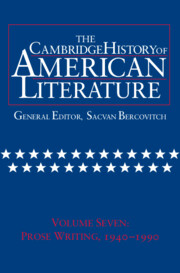Book contents
- Frontmatter
- Introduction
- The Drama, 1940—1990
- Fiction and Society, 1940–1970
- After the Southern Renascence
- Postmodern Fictions, 1960–1990
- Emergent Literatures
- 1 From Marginal to Emergent
- 2 Comparative Racism and the Logic of Naturalization
- 3 Nisei Sons and Daughters
- 4 Legacies of the Sixties
- 5 Refusing to Go Straight
- 6 Beyond Hybridity
- Appendix: Biographies
- Chronology, 1940–1990
- Bibliography
- Index
2 - Comparative Racism and the Logic of Naturalization
from Emergent Literatures
Published online by Cambridge University Press: 28 March 2008
- Frontmatter
- Introduction
- The Drama, 1940—1990
- Fiction and Society, 1940–1970
- After the Southern Renascence
- Postmodern Fictions, 1960–1990
- Emergent Literatures
- 1 From Marginal to Emergent
- 2 Comparative Racism and the Logic of Naturalization
- 3 Nisei Sons and Daughters
- 4 Legacies of the Sixties
- 5 Refusing to Go Straight
- 6 Beyond Hybridity
- Appendix: Biographies
- Chronology, 1940–1990
- Bibliography
- Index
Summary
In N. Scott Momaday’s House Made of Dawn, the Native American protagonist, Abel, is brutally beaten without provocation by a Chicano policeman named Martinez. Richard Rubbio, the Chicano protagonist of José Antonio Villarreal’s Pocho first learns about racism by observing the way his friends discriminate against a Japanese boy named Thomas. Midway through John Okada’s No-No Boy, a young Japanese American veteran named Kenji realizes that instead of finding ways to unite to achieve common goals, America’s minority cultures continually find ways to discriminate against one another and even against their own members:
The Negro who was always being mistaken for a white man becomes a white man and he becomes hated by the Negroes with whom he once hated on the same side. And the young Japanese hates the not-so-young Japanese who is more Japanese than himself, and the not-so-young, in turn, hates the old Japanese who is all Japanese and, therefore, even more Japanese than he.
Kenji tries to find a “pattern” that can be “studied” so that “answers” can be “deduced,” but all he is able to conclude is that “the world was full of hatred.” What he does not manage to articulate is the fact that the disunity of America’s marginalized cultures, evident in these three novels, is no accident.
- Type
- Chapter
- Information
- The Cambridge History of American Literature , pp. 564 - 591Publisher: Cambridge University PressPrint publication year: 1999



